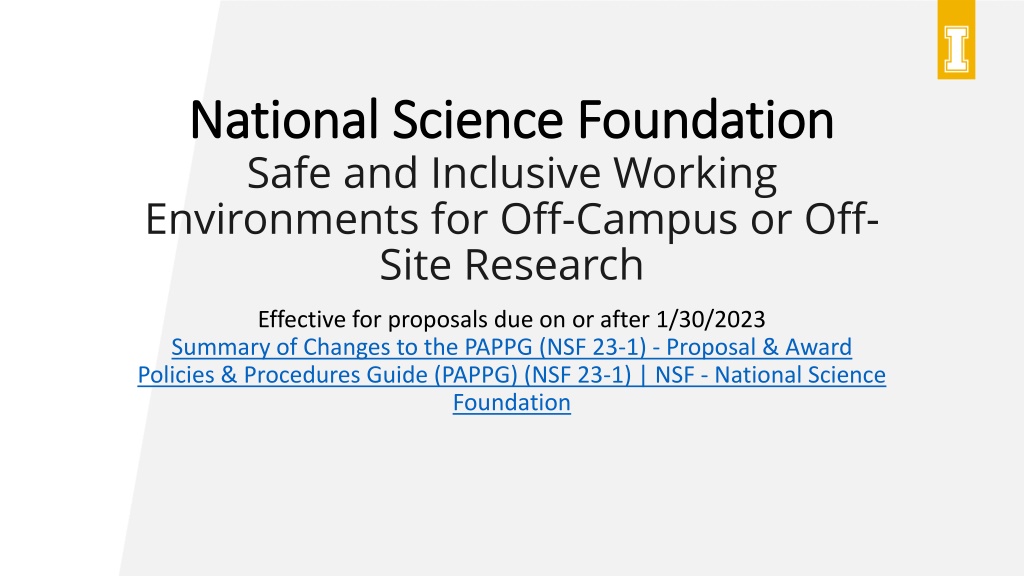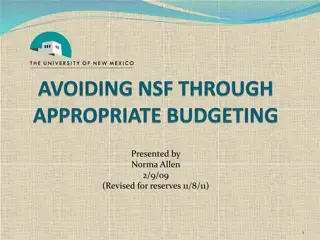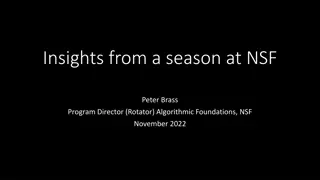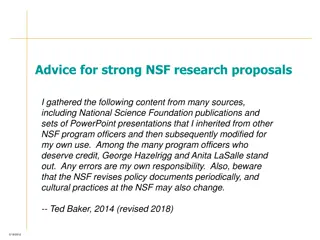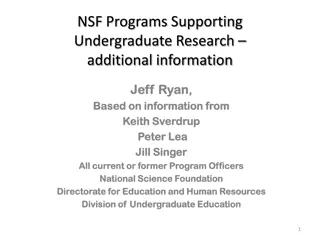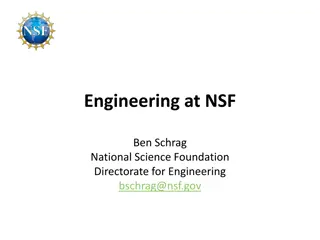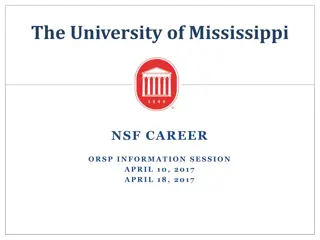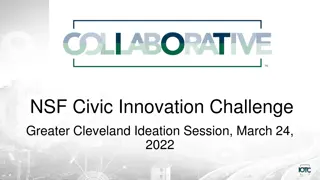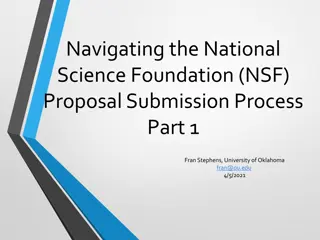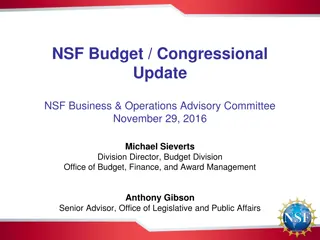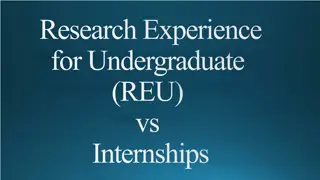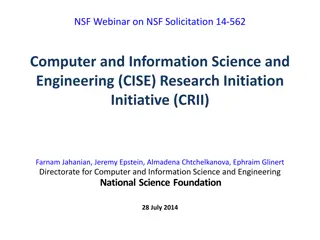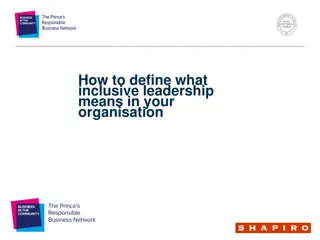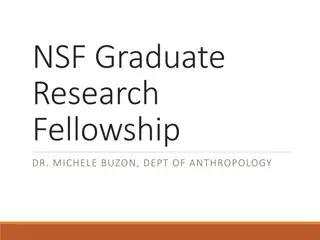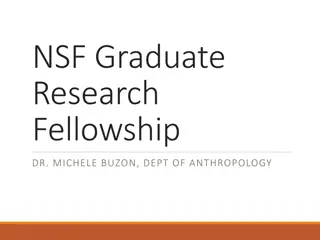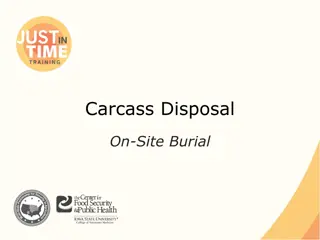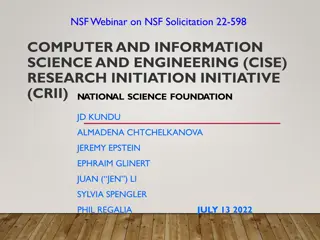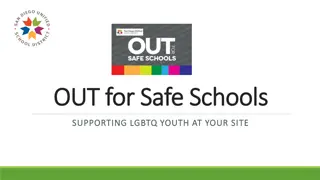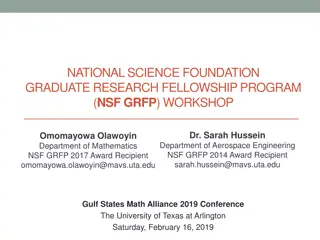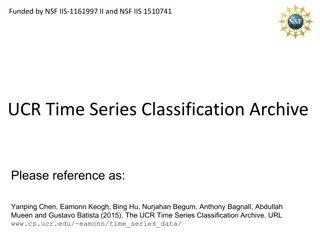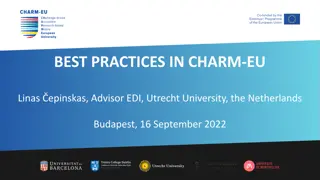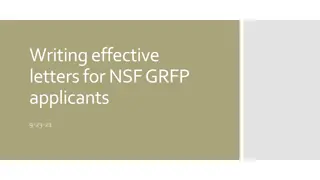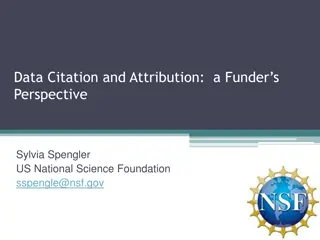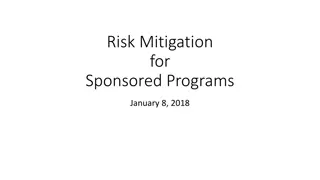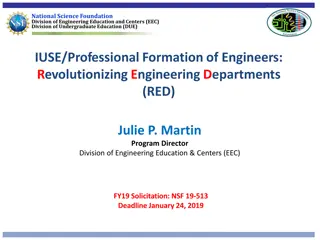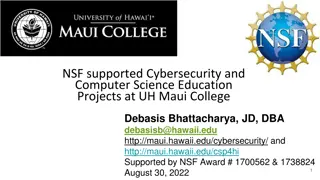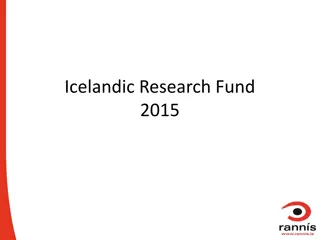NSF Policy Update: Safe and Inclusive Research Environments for Off-Site Projects
NSF has updated its policy to ensure safe and harassment-free working environments for off-campus research projects. Organizations must now provide a per-proposal plan addressing behaviors like abuse, harassment, and unwelcome conduct. The policy expands on NSF's 2018 stance on sexual harassment and requires certification of the plan's existence at proposal submission.
Download Presentation

Please find below an Image/Link to download the presentation.
The content on the website is provided AS IS for your information and personal use only. It may not be sold, licensed, or shared on other websites without obtaining consent from the author. Download presentation by click this link. If you encounter any issues during the download, it is possible that the publisher has removed the file from their server.
E N D
Presentation Transcript
National Science Foundation National Science Foundation Safe and Inclusive Working Environments for Off-Campus or Off- Site Research Effective for proposals due on or after 1/30/2023 Summary of Changes to the PAPPG (NSF 23-1) - Proposal & Award Policies & Procedures Guide (PAPPG) (NSF 23-1) | NSF - National Science Foundation
Policy outline National Science Foundation policy requires fostering safe and harassment-free environments where science is conducted (via 2018 policy). This policy now also requires a per proposal plan for off-site of off-campus research AND the AOR must certify that the organization has this plan in place at proposal submission. The certification identifies that the entity (University of Idaho) proposal plan describes how the following behaviors will be addressed for the project off- site research work: Abuse of any person, including, but not limited to, harassment, stalking, bullying, or hazing of any kind, whether the behavior is carried out verbally, physically, electronically, or in written form; or Conduct that is unwelcome, offensive, indecent, obscene, or disorderly.
Policy background This off-site safe work environment policy is an expansion on NSF s 2018 policy on Sexual Harassment, Other Forms of Harassment, or Sexual Assault. The reporting requirements from the 2018 policy are continued into this new off-site safe and inclusive environment policy. The reporting obligations to NSF are detailed further in the following slides. NSF policy also requires compliance with other federal statutes and regulations, including (but not limited to) non-discrimination. Proposers and recipients may contact the Office of Equity and Civil Rights (OECR) at this link or at 1-703-292-8020 with any questions regarding these non-discrimination statutes and their implementing NSF regulations and their applicability to their institutions' programs, services, and activities.
NSF Policy on Sexual Harassment, Other Forms of Harassment, or Sexual Assault As the primary funding agency of fundamental science and engineering research in the U.S., NSF is committed to promoting safe, productive research and education environments for current and future scientists and engineers. The Foundation considers the PI and any co-PIs identified on an NSF award to be in positions of trust. The PI and co-PI(s) and all award personnel must comport themselves in a responsible and accountable manner during the performance of award activities whether at the recipient organization, on-line, or conducted outside the organization, such as at field sites, or facilities, or during conferences and workshops. The 3,000 U.S. IHEs and other organizations that receive NSF funding are responsible for fully investigating complaints and for compliance with federal non-discrimination laws, regulations, and executive orders. In support of this position, the Foundation has taken steps to bolster our commitment to a safe research environment, including development and implementation of an award term and condition that requires NSF to be notified: 1) of any findings/determinations regarding the PI or co-PIs that demonstrate a violation of awardee codes of conduct, policies, regulations or statutes relating to sexual harassment, other forms of harassment, or sexual assault; or 2) if the awardee places the PI, or co-PIs on administrative leave or imposes an administrative action relating to a finding or investigation of a violation of awardee policies, codes of conduct, statutes or regulations relating to sexual harassment, other forms of harassment, or sexual assault. See Chapter VII.B.3 for additional information on the notification process. NSF expects all research organizations to establish and maintain clear and unambiguous standards of behavior to ensure harassment-free workplaces wherever science is conducted. NSF has developed a sexual harassment prevention website that includes promising practices on policies, effective codes of conduct, and standards of behavior, as well as Frequently Asked Questions that respond to inquiries received on this complex topic. A community effort is essential to eliminate sexual and other forms of harassment in science and to build scientific workspaces where people can learn, grow, and thrive. https://beta.nsf.gov/policies/pappg/23-1/ch-11-other-post-award-requirements#a-non-discrimination-statutes-and-regulations-751
University of Idaho Office of Civil Rights and Investigations University of Idaho Office of Civil Rights and Investigations This office is responsible for ensuring compliance with federal and state laws related to discrimination or harassment based on a protected class. This includes retaliation when engaging in a protected process. We undertake necessary investigations and prepare recommendations and written reports. University of Idaho employees have a responsibility to report cases of discrimination and harassment. What resources are available from OCRI? Resources from the Office of Civil Rights and Investigations (uidaho.edu) What policies apply? Policy and Procedure (uidaho.edu)
Plan template OCRI has developed a plan template that corresponds with NSF policy and the University of Idaho policies relating to this new NSF requirement. The template is available from the OSP pre-award team, VERAS help tip menu, and will be posted here. It is the responsibility of the proposal Principal Investigator to complete and submit the template plan to OSP (via VERAS) and to ensure the plan is disseminated per NSF policy and adhered to. Changes to the plan must be coordinated to OSP prior to implementation to ensure the plan record is up to date in VERAS.
What must the plan include? The plan must describe how the following types of behavior will be addressed: a. abuse of any person, including, but not limited to, harassment, stalking, bullying, or hazing of any kind, whether the behavior is carried out verbally, physically, electronically, or in written form; or b. conduct that is unwelcome, offensive, indecent, obscene, or disorderly. The plan must identify how the UI will support an inclusive off-campus or off-site working environment (via trainings, roles and responsibilities assignments in the plan or otherwise, codes of conduct, mentor/mentee mechanisms, etc.)
The plan continued details The plan must include details on team communication, and should consider: Minimizing single point of contact communication pathways, Special circumstances related to work location (site), The involvement of multiple entities and third parties within the site and plan elements, How any reports received will be received and resolved. The plan must be disseminated to all off-site or off-campus research work participants prior to work commencement and be included in the proposal record. The plan IS NOT submitted with the proposal to NSF unless the solicitation specifies otherwise.
VERAS Proposal processing A new question will be added in VERAS to collect information related to this policy requirement This will allow OSP to pull data relating to this requirement and will also allow pre-award team to assist faculty and staff in ensuring this plan is included in the proposal documents in VERAS. The plan must be included with the proposal documents in VERAS before proposal approval, but it is not to be included in the submission to NSF unless the proposal guidance specifies otherwise.
What is your role in fostering a safe and inclusive work environment? As detailed in the NSF and University of Idaho policies, we each play a role in ensuring a safe and inclusive work environment. What do we do if we witness an instance of discrimination or harassment (in any of the forms detailed in policy)? For general reporting for any instance of discrimination or harassment: Submit a report to OCRI as detailed on the next slide. For reporting or formal complaints related to an NSF funded project or program: Report to OCRI as outlined on the next slide, or to the NSF directly, as detailed on slides 12 15. If this is off-site or off-campus research work funded by NSF: See the plan specific to the proposal for processes on reporting but note either of the above reporting avenues apply.
Reporting to UI OCRI University of Idaho staff, students, and faculty, as well as third-parties, can report to the University of Idaho Office of Civil Rights & Investigations. Report Discrimination or Harassment (uidaho.edu) Per NSF policy, OCRI works with the Office of General Counsel and Office of Research and Economic Development to ensure appropriate reporting is completed to the National Science Foundation relating to anti-discrimination statutes and policies.
Difference between a report and formal complaint A report of discrimination or harassment is a notification by individuals and organizations which alleges discrimination or harassment, that may violate the regulations on slide 10, has occurred or is occurring in an NSF-funded program or activity. A report can lead to NSF initiating the formal compliant process. Who Should File a Formal Complaint? Individuals who feel they have been discriminated against or harassed in an NSF-funded organization on the basis of race, color, national origin, sex, disability, or age may file a complaint with NSF. Individuals may also file a complaint with NSF if they believe they have been retaliated against for filing a complaint, participating in a complaint investigation, or exercising rights provided by these regulations. Filing a formal complaint is a request for OECR to investigate the allegation of harassment or discrimination. An OECR investigation is a finding of fact whether the above laws and regulations were violated by the NSF awardee. OECR may need written consent to provide names of complainants to the awardee in order to investigate and resolve complaints. Although complaints may withhold consent and remain anonymous, the scope of the investigation may be limited. In this situation, OECR may close the complaint if the release of the complainant's identity is deemed crucial to the investigation and resolution of the complaint.
How to file a report to NSF directly NSF Awardee Civil Rights Compliance Program's mission is to ensure awardee organizations comply with the following civil rights laws and regulations: Title VI of the Civil Rights Act of 1964 (prohibits discrimination on the basis of race, color, or national origin) Section 504 of the Rehabilitation Act of 1973 (prohibits discrimination on the basis of a disability) Title IX of the Educational Amendments of 1972 (prohibits discrimination on the basis of sex) Age Discrimination Act of 1975 (prohibits discrimination on the basis of age). General Process Individuals who wish to report harassment or discrimination and believe the basis of the harassment or discrimination may violate any of the regulations above should contact programcomplaints@nsf.gov, call (703) 292-8020, or mail to OECR. OECR will confirm receipt of communications within 48 business hours. OECR will also explain rights and responsibilities of the individuals and discuss possible next steps, such as filing a formal complaint. Please note, OECR will take appropriate steps to protect the names and other personally identifiable information of individuals who submit reports of harassment or discrimination consistent with NSF policy as well as the Privacy Act, FOIA, and other applicable federal law. NSF awardees may not retaliate against individuals who report harassment or discrimination; file harassment or discrimination complaints; participate in a harassment or discrimination complaint; or participate in compliance review as a witness, interviewee and other protected activities. https://www.nsf.gov/od/oecr/awardee_civil_rights/index.jsp
How to file a report to NSF directly - continued Who Should Report Harassment or Discrimination? Anyone who has experienced, witnessed, or is otherwise knowledgeable of harassment or discrimination from an NSF awardee should report it to OECR. A report of discrimination or harassment is a notification by individuals and organizations which alleges discrimination or harassment, that may violate the regulations defined above, has occurred or is occurring in an NSF-funded program or activity. These reports may be made by: Individuals and organizations that have not been harassed or discriminated against but are aware of harassment and discrimination happening to others in NSF-funded programs. Individuals or organizations who wish for OECR to address, investigate, or resolve alleged harassment and discrimination and: wish to remain anonymous; are not seeking a remedy for themselves but to remedy the alleged harassment; or are seeking to remedy discrimination in a collaborative manner with the NSF awardee that avoids a formal complaint investigation, formal findings of fact, and a determination of the awardee's compliance with above laws and regulations. Reporting To report harassment or discrimination (and filing a formal complaint is not desired) send the information to programcomplaints@nsf.gov, call (703) 292-8020, or mail to OECR at: Head, Office of Equity and Civil Rights (OECR), 2415 Eisenhower Avenue, Suite W 17200 Alexandria, VA 22314 https://www.nsf.gov/od/oecr/awardee_civil_rights/index.jsp
How to file a formal complaint Filing a Formal Complaint To file a complaint requesting NSF to investigate the allegation of harassment or discrimination, an individual should use our online NSF Awardee Program Complaint Form. If you require a different format to submit a formal complaint please contact us at programcomplaints@nsf.gov, call us at (703) 292-8020, fax us at (703) 292-9482. If an individual informs other NSF offices, divisions, and directorates of harassment or discrimination, the information should be forwarded to OECR. OECR will contact the individual who raised the allegations to determine if the individual wishes to file a discrimination complaint. More information on the complaint process can be found at https://www.nsf.gov/od/oecr/awardee_civil_rights/titlevi_ix.jsp. https://www.nsf.gov/od/oecr/awardee_civil_rights/index.jsp
AOR Reporting Responsibilities Note that per the NSF term and condition that requires reporting of Findings of Sexual Harassment and Other Forms of Harassment as detailed in these slides, it is also includes the responsibility of the University of Idaho Authorized Organizational Representative (AOR) to report findings of this nature to the National Science Foundation. The AOR works with OCRI and the UI Office of General Counsel to ensure appropriate reporting occurs within the auspices of the NSF and University of Idaho policies. NSF directive on this reporting: Authorized Organizational Representatives (AOR)s must use the Term and Condition Required Notification of Harassment form to submit a required notification to NSF. When submitting a report, please note that only the identification of the PI or co-PI is required. Personally identifiable information regarding any complainants or other individuals involved in the matter MUST NOT be included in the notification.
NSF Policy links Chapter II: Proposal Preparation Instructions - Proposal & Award Policies & Procedures Guide (PAPPG) (NSF 23-1) | NSF - National Science Foundation Chapter XI: Other Post Award Requirements and Considerations - Proposal & Award Policies & Procedures Guide (PAPPG) (NSF 23-1) | NSF - National Science Foundation Frequently Asked Questions (FAQs) Regarding NSF's Award Term and Condition Entitled, "Notification Requirements Regarding Sexual Harassment, Other Forms of Harassment, or Sexual Assault OECR - Term and Condition: Sexual Harassment, Other Forms of Harassment, or Sexual Assault | NSF - National Science Foundation
